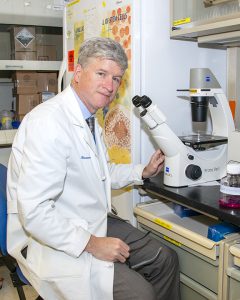
Charlie Searles
Atherosclerotic cardiovascular disease (ASCVD) is the number one killer of Americans and the leading cause of hospitalization in the VA health care system. Atherosclerosis is an inflammatory process that develops in arteries because of the presence of risk factors such as smoking, diabetes, hypertension, high cholesterol, obesity, and aging. However, regardless of risk factors, atherosclerotic lesions preferentially develop at locations in the arterial tree where blood flow is disturbed. Despite recent advances in risk factor control, thousands of Veterans die yearly due to complications of ASCVD. Thus, there is an urgent need to identify novel molecular targets for therapies that could improve the health of the hundreds of thousands of Veterans with ASCVD.
Charlie Searles MD, a Staff Cardiologist at the Atlanta VA, runs a research program that addresses this important problem. Based on evidence that atherosclerotic lesions preferencially develop where blood flow is low and disturbed by branching or curving of the blood vessel, the Searles lab has examined how altered flow causes vascular disease. Their studies determined that microRNAs (miRNAs), short molecules that regulate cell function, play an important role. In an animal model, altered blood flow reduced the expression of miRNA-155 which controls the expression of inflammatory genes involved in atherosclerosis. Altered blood flow increased inflammation. In contrast, increasing levels of miR-155 by intravenous injection lessened inflammation. These findings suggest that miR-155 provides a promising new therapeutic target for treatment of inflammation and atherosclerotic vascular disease.